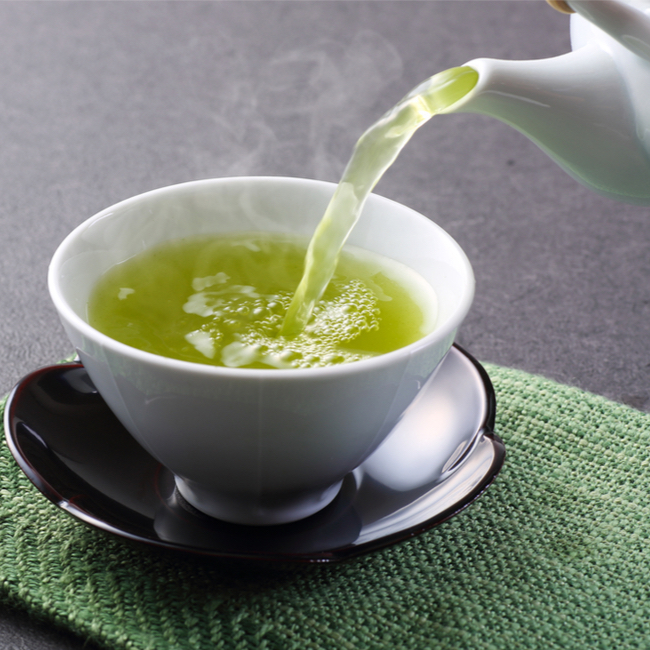
3 Vital Teas That Boost Collagen & Promote Glowing Skin Over 40, According To Doctors
1. Green Tea
Green tea is a comforting and soothing beverage to conclude your day with (decaf of course) and its antioxidant compounds reduce skin inflammation. In addition, it only takes a few minutes to brew a cup! Now that the weather is warmer, you can enjoy it iced as well. "The addition of green tea to your routine is a great way to [aid] your skin with the antioxidants that may help reduce inflammation and help the skin’s natural repair process," Ilyas explains.
She notes that green tea differs from black tea in how it is made, and is the ultimate best tea choice for your skin when it comes to antioxidant levels. "Green tea is not fully oxidized in the manner black tea is, so it retains the green color of the leaves. It tends to have higher concentrations of a polyphenol including one called epigallocatechin gallate (EGCG)," Ilyas says, noting that green tea polyphenols have demonstrated a number of skincare benefits including antioxidant effects.
"The benefit of EGCG is that some studies have demonstrated its ability to potentially inhibit tyrosinase, an enzyme that contributes to skin pigmentation," she continues. By inhibiting the enzyme, there is potential to reduce pigmentation in your skin.
She also says that there are even studies that have demonstrated that consumption of green tea may be linked to reducing the signs of sun damage in our skin as it related to pigmentation.
2. Hibiscus Tea
In a recent viral TikTok video, the popular creator Anya Levi unveiled the skin-enhancing virtues of hibiscus tea, highlighting its potential to “slow down” and delay aging due to its rich antioxidant content. Sabat concurs, and tells us that “herbal teas like hibiscus are naturally caffeine-free and calorie-free.”
She points out that “they offer a naturally sweet and aromatic flavor without adding sugars or calories.” Adding a bit of natural sweetener, such as stevia, is another good option in place of sugar when it comes to your skin health, the expert explains. Hibiscus tea, she observes, is a powerhouse of nutrients, brimming with vitamin A, B1, B2, C, along with zinc and iron. Beyond these, it also boasts omega-3 fatty acids and natural alpha hydroxy acids (AHAs), both crucial for achieving that radiant, glowing skin we all desire.
Opting for an herbal tea like hibiscus with or without a natural sweetener "will provide healthy antioxidants and hydration which will promote new skin production and give skin a healthier and plump appearance," Sethi notes. The more you know!
3. Ginger Tea
This drink can be great to begin your morning with as it is known to combat bloating and inflammation (which many suffer from upon waking up). "Ginger is unique to inflammation in that it contains compounds known as gingerols and shogaols," Best explains. These compounds, she says, create an antioxidant effect in the body that reduces free radical damage.
"This damage leads to an increase in oxidative stress" that can wreck havoc on your skin, she adds. This damage, she notes, occurs at a cellular level and once those damaged cells replicate the body's natural processes that maintain homeostasis, can "become disrupted, leading to decreased metabolism, energy, and more.”
Opting for ginger tea over coffee or other flavored teas that offer no benefits is a great way to get antioxidants and boost your overall health, Best stresses. "It is an easy addition to your current health regimen and daily routine, without losing the flavor and warmth of other hot beverages you'd be enjoying otherwise," she says. Qazi concurs, and adds that the caffeine in coffee may bring the rush you want to get through your day, "however, [this kind] can rob your skin of the elasticity your desire and reduce your skin's natural glow," he adds.
Drinking more ginger tea for energy as opposed to coffee can do wonders for your complexion, he notes, as many processed coffee beverages can be "full of toxins that can leave the skin dry and dehydrated, especially when consumed excessively."
The Bottom Line
"Collagen consumption can increase skin elasticity and can help your body’s skin repair process," Jaliman concludes, "thus encouraging your body to form new collagen."
For more information and to preserve and take care of your optimal skin, our experts recommend visiting your dermatologist for more personalized advice.


